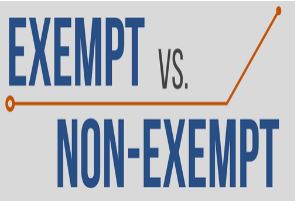The Fair Labor Standards Act (FLSA), enacted in 1938, has four major provisions: regulations for minimum wage, overtime pay, record keeping and child labor law. It also introduced standards for exempt and non-exempt employees. As it relates to the FLSA, exempt means free from an obligation of overtime pay. Note that FLSA regulates the Federal standards; the states may have different regulations in each of these areas.
What is an exempt employee?
Exempt employees are not eligible for minimum wage, overtime regulations, and other protections that are extended to non-exempt employees. Exempt employees receive a set salary every pay period. Exempt employees are typically salaried workers and often fill executive, supervisory, or administrative positions.
Which employees are covered under the FLSA law?
Enterprise Coverage: If a business is covered then all employees of the business are entitled to FLSA protection. What businesses are covered under enterprise coverage?
- Business has at least two employees and does sales of at least 500,000
- Named enterprise coverage: Hospital, business providing medical or nursing care for residents, school, preschool, or public agency, whether private or non profit
Individual Coverage: Individual employees in an organization may be entitled to FLSA protection even if the entire organization is not entitled to FLSA protection
- Individual is engaged in activity that involves working across state lines (interstate business) on a regular basis
- Domestic service workers (e.g., housekeeper, cook, babysitter)
Should an employee be classified as exempt or non-exempt?
- An employer should consider all employees as non-exempt and overtime eligible unless they can meet a specific exemption under federal or state law
- An employee who remains in the same job position should not move back and forth between exempt and non-exempt. Further, an employer cannot decide that they want to make an employee exempt. The regulations determine FLSA classification.
- Job title does not determine classification
Employers must correctly classify their employees as exempt or non-exempt or they run the risk of accruing compliance violations.
Can any worker qualify as an exempt employee?
An employer may wish to classify all employees as exempt employees – in this way avoiding the requirement to pay time and a half for overtime hours worked. However, not all employees are eligible to be classified as exempt employees.
The Department of Labor (DOL) has established guidelines to determine who is eligible to be considered exempt. The qualifications generally fall into three categories: salary exemption, nature of payment, and job duties. An employee must pass the tests in all three categories to qualify for exempt status.
Exempt employees test #1: total earnings
The first test to qualify an employee for exempt status is that the employee must earn the salary threshold set by the FLSA to be exempt. The minimum salary threshold of the FLSA changes every year. In 2021, the required minimum employee compensation to have exempt status was $684 per week ($35,568 per year). This salary threshold must be met regardless of being part time or full time. If the salary threshold is not met, the employee may not be classified as exempt (with an exception for teachers, doctors, and lawyers).
Exempt employees test #2: nature of payment
The second test to qualify an employee for exempt status is that the employee must be paid on a salaried basis, where compensation is not reduced due to quantity or quality of work.
Exempt employees test #3: job duties
The third test to qualify the employee for exempt status is whether the employee meets the job duties that qualify for exempt status. There are only certain job duties that qualify an employee for exempt status. These job duties involve a higher level of expertise or knowledge or require the employee to hold certain professional roles. There are several categories of job duties exemptions:
Executive exemption: employees who would qualify for an executive exemption would
- Regularly supervise employees
- Be responsible for managing part of the business
- Play a role in hiring employees or in delegating tasks
Administrative exemption: employees qualifying for an administrative exemption would
- Perform office jobs directly related to business operations or management of the organization and its customers
- Exercise independent judgement over business decisions
Professional exemption: employees qualifying for a professional exemption would
- Perform job duties that require specialized education
- Have a college degree or higher in their field
Computer exemption: employees with this exemption would
- Have a computer related role
Outside sales exemption: employees qualifying for this exemption would
- Have a primary duty of making sales or securing contracts or orders
- Conduct their work outside of the business’ premises
Where can you find out more?
- Department of Labor – Job duties exemption: FLSA – job duties
- FLSA tests for exempt employee: FLSA tests for exempt employee





0 Comments
Trackbacks/Pingbacks